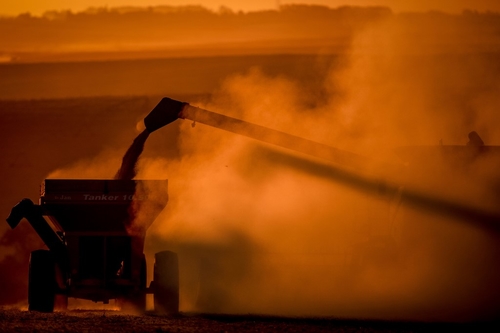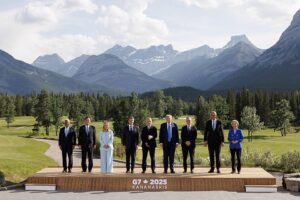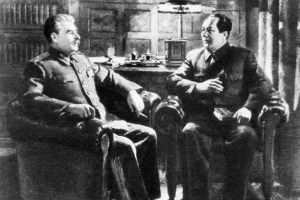
The free trade agreement being discussed between Mercosur and the European Union should stimulate the agro-export model in South American countries and could be fatal for small producers in the region. This is the vision of peasant movements in Argentina, Paraguay and Uruguay, member countries of the bloc, who spoke with the Brazil in fact during the 8th Via Campesina International Conference taking place in Bogotá, capital of Colombia.
For Diego Montón, representative of the Peasant Movement Somos Terra in Argentina, the agreement encourages unequal conditions of competition with food products from Europe which, in addition to receiving subsidies from European governments, would be imported without tariffs, which would harm local production.
“It is a bad agreement for the people, but particularly for family farming and small and medium-sized farmers, for cooperatives, as it will generate a very negative economic impact, both on the sector’s export conditions and on the domestic market conditions, which is where our sector has the most impact”, he said.
::Understand the Mercosur-EU agreement and why it is rejected by popular movements::
On the other hand, the absence of customs barriers for the export of commodities South American companies, says the activist, would further stimulate this sector on the continent, which would bring even more dependence to the countries, generate little employment and almost no return to public coffers. In 2021, primary products dominated the bloc’s exports to the EU, representing 78% of the total. Leading the main products exported by Mercosur is soybeans, followed by ores and oil.
“Some concentrated sectors, exporters, would benefit from this type of agreement. In Argentina, this sector is represented by agribusiness, especially cereal producers who have great external competitiveness due to soil fertility and proximity to the port, as all installed infrastructure it is already focused on exports. This is the only sector that would benefit greatly, the others would not”, he stated.
The negotiation dragged on for 20 years before moving forward and having its main terms defined in 2019, when the right-wing governments of Jair Bolsonaro and Mauricio Macri governed Brazil and Argentina, respectively. For critics of the agreement, the presence of neoliberal governments in the main countries of the bloc made it easier for the final version to be unfavorable for national economies.
President Lula, who was holding the temporary presidency of Mercosur, had been trying to renegotiate some terms of the agreement with the Europeans, but encountered resistance. This Thursday (07), during a summit of the bloc’s presidents in Rio de Janeiro, the PT member said that he made an appeal for the president of France not to be “so protectionist” and that he asked the German chancellor, Olaf Scholz, to talk with the Frenchman, “but he didn’t make it either.”
:: For Via Campesina, the agreement being discussed between Mercosur and the European Union is ‘unfair and exclusionary’ ::
Montón says that Lula is playing an important role in this mediation, especially given the risks that the new government of Argentine president-elect, Javier Milei, could bring to free trade agreements. Brazil ended its presidency of the bloc this Thursday, and Milei takes office next Sunday (10).
“Milei’s program indicates that it could go much further than this EU-Mercosur agreement, he has a radical idea of a free market, which in fact is not free due to the presence of large corporations. So we are going down a path in which many small companies will close and medium-sized companies, many people will be out of work, food prices will skyrocket and it is clear that they are also preparing a repression package, because the Argentine people will take to the streets”, he said.
Another country that would have its peasants harmed is Paraguay. To the Brazil in factthe representative of the Organization of Peasant and Indigenous Women (Conamuri), Perla Álvarez, says that the country has already been neglecting small producers to make way for soybean and corn crops for export and that the agreement should accelerate the production of these commodities.
“For a small country like Paraguay, the impacts are big. The government is proud to be one of the largest soy exporters in the world, which at a macroeconomic level sounds interesting, but the return that this leaves to the country is small compared to the enormous profits that companies take abroad, with foreign exchange drain”, he explains.
In 2021, Paraguay became the 3rd largest soy exporter on the planet and today has 80% of its land under cultivation dedicated to the production of soybeans. commodity. According to data from Oxfam, in the last 10 years more than 900,000 Paraguayan peasants have had to leave their territories due to lack of jobs and land to work due to the concentration of agribusiness.
:: Mercosur-EU Agreement: time to abandon a dangerous negotiation ::
According to Álvarez, the agreement with the Europeans aims to increasingly encourage “agriculture without peasants”. “The agreement is also a channel for resources to come in for what they call the digitalization of agriculture, which is agriculture without peasants. In Paraguay, we are increasingly left out and many have become just small vegetable producers on small lands. This hurts our cultural right, as peasants, and economic right to be able to develop in the countryside”, he said.
The smallest country in terms of size in the bloc, Uruguay’s main source of foreign exchange is agricultural exports. For Leticia Cabrera, from the National Network of Native and Creole Seeds of Uruguay, this characteristic of the country should be highlighted if the agreement is signed.
“There is already a large wave of migration from the countryside to the city driven by agribusiness and, in addition, one of the most serious problems we have at the moment, which is the expansion of the cultivation of transgenic soybeans and eucalyptus, should benefit from this agreement”, told the Brazil in fact. For Leticia, the treaty did not consider “the opinion of civil society in general, much less of the peasants” and the proposed terms are harmful to the country’s food sovereignty.
New FTAA?
Critics of the project have made comparisons of the EU-Mercosur agreement with the Free Trade Area of the Americas (FTAA), a US project that was blocked at the 2005 Summit of the Americas in Mar del Plata, with strong opposition from Brazil, then governed by Lula. , from Argentina, led by Néstor Kirchner, and Venezuela, led by Hugo Chávez.
For the fighting movements in the Mercosur field, there are some similarities of an economic nature, since both the FTAA and the agreement with the EU presuppose free trade areas. However, peasant activists highlight ideological and historical differences between the moments.
:: 15 years of no to the FTAA: overcoming capitalism is still the alternative ::
“Perhaps the difference is that the FTAA was orbiting the US political strategy, which had a clear vision of subordinating the entire continent. In this current case, the protagonist is the EU and the agreement has more to do with the strategy of transnational companies, that aim to advance the food market”, said Diego Montón.
The Argentine also says that “the EU-Mercosur agreement is a perfect example of everything we are fighting against and that is why we are holding the debate on the need for public policies to strengthen a sector that, instead of speculating with food, will generate more employment and produce healthy food for the people”.
For Perla Álvarez, the FTAA and the agreement with the Europeans “have the same principle, of breaking down barriers for goods, but not for people.” “So it’s a very unfair issue: that goods flow freely, regardless of the social and cultural costs of this process,” she said.
Editing: Rodrigo Durão Coelho
Source: www.brasildefato.com.br

